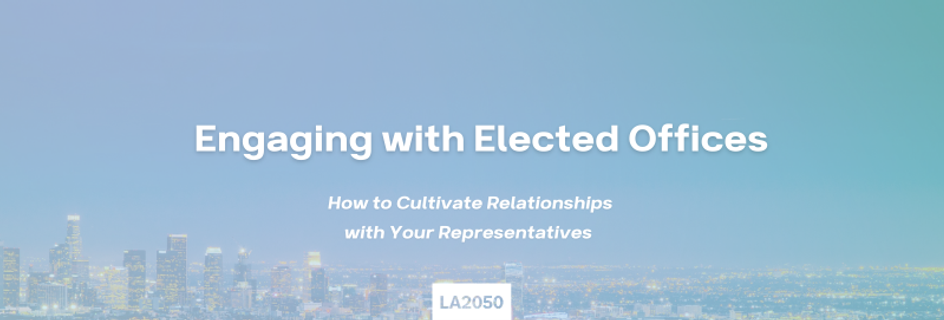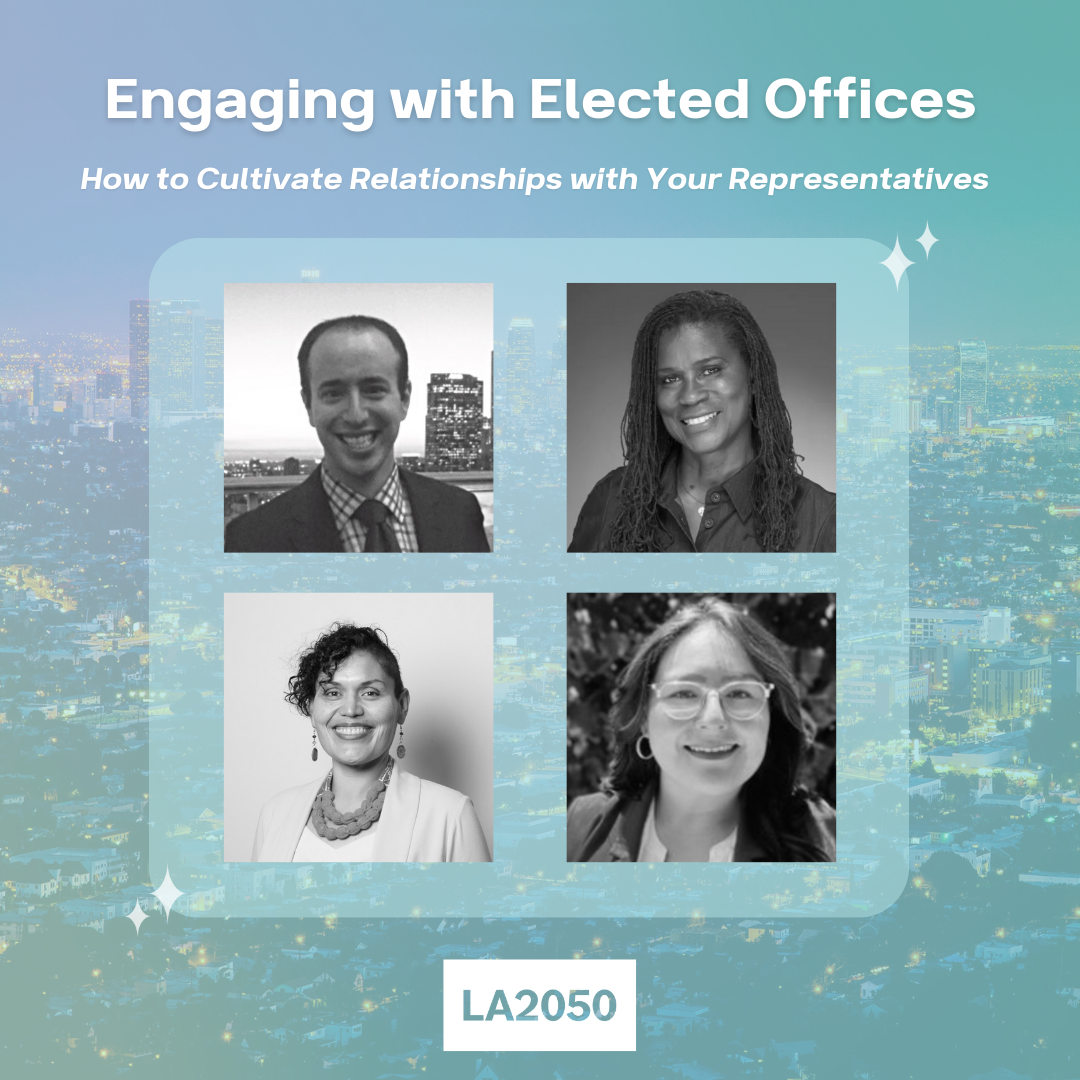LA2050 Blog
We’ve got access to the information that every Angeleno needs to make an impact. Our blog features the latest LA2050 news, announcements, features, happenings, grantee updates, and more.

Key Takeaways from “Engaging with Elected Offices - How to Cultivate Relationships with Your Representatives”
PostedOn November 14th, LA2050 hosted “Engaging with Elected Offices - How to Cultivate Relationships with Your Representatives,” a virtual panel and Q+A session for more than 50 LA2050 grantees and partners.

The session was moderated by LeAnn Kelch Melendez, Director of Grants and Programs at the Goldhirsh Foundation / LA2050, and featured the following panelists:
- Caleb Rabinowitz, Chief of Staff, Assemblymember Isaac Bryan (AD 55)
- Denise Jackson, Office and Finance Manager, Councilmember Marqueece Harris-Dawson (CD 8)
- Isela Gracian, Senior Deputy, Homelessness & Housing, LA County Supervisor Holly J. Mitchell
- Vanessa Serrano, Interim General Manager, EmpowerLA (LA City Department of Neighborhood Empowerment)
The panelists shared practical insights into how to identify common goals between nonprofit organizations and their representatives, access financial and other resources available to organizations from offices, build relationships in support of advocacy and engagement work, and share knowledge with each other and the broader community.
Below, we have outlined some of the key takeaways from the conversation.
Before your first meeting:
- Identify your “ask.” Knowing what you need will help the office to ensure that you are connected with the right person. And, don’t feel like you need to insist on a meeting with the elected themselves; often, it’s best to connect with the staff that work directly on a particular issue.
- Review the office’s particular jurisdiction. Is your issue best addressed at the national, state, county, city, or neighborhood level?
- Research the elected official, the issues that they care about, and the work their office is doing in your community. This can be as simple as checking out their website or browsing their social media looking for common interests and getting a sense of their upcoming schedule. [If the official already knows about your issue, then you cut to the chase when you meet, and save valuable time.]
- Prepare a simple agenda for the meeting to ensure that you take advantage of your time together. Remember to keep the meeting conversational, rather than focusing on basic background information they might already have.
To maintain a relationship:
- Pursue continued partnerships with local offices. Reach out to them if your organization is fighting for a specific cause that an office has an interest in.
- Connect with the office’s field representatives, deputies,neighborhood council board members, or other staff responsible for liaising with members of the community. They can act as an internal advocate for your organization.
- Utilize the office’s communications capacity. They can help you amplify your message to new audiences and even promote your events.
- Invite your elected representatives, their team, and their constituents to your events, and show up for theirs! Relationships go both ways.
- Share your organization’s “wins” with your local offices. Your elected officials want to know about the great work you do for the district, and uplift your achievements.
Each panelist also shared words of encouragement with our attendees:
- Isela Gracian advised attendees to start relationships both “strategically” and “intentionally” to help them frame their asks to an office with clear focus.
- Caleb Rabinowitz shared that organizations should pursue relationships with elected officials and their offices with “passion” and “persistence.” An organization’s passion for a specific issue area should energize an office’s staff. (And don’t be afraid to reach out multiple times!)
- Denise Jackson encouraged attendees to convey a sense of “consistency” and “stability” through their relationships with elected offices. Know when to “toot your own horn” and advocate on behalf of the great work you do.
- Vanessa Serrano motivated attendees to “get involved,” whether that be showing up to a neighborhood council meeting or sharing wins with your local representatives. Offices are likely to return the favor if there is a history of engagement.
Thank you to all four panelists for contributing to this important discussion and offering their insights. We are so inspired by the potential for collaboration between our grantees and their representatives! We hope that this conversation is the beginning of lasting relationships that create measurable impact for our communities.